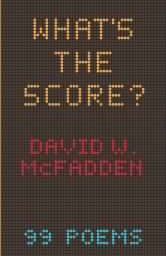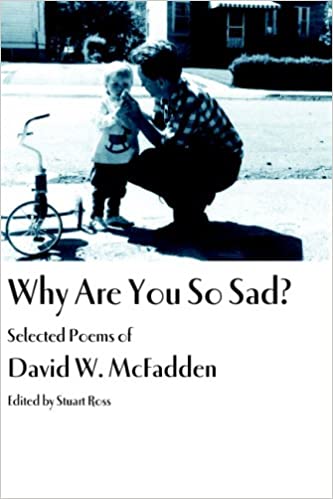
Born in Hamilton, Ontario in 1940, David W. McFadden began writing poetry in 1956 and began publishing poetry in 1958. He was the author of more than thirty-five books of poetry, fiction, and travel writing. He won the 2013 Canadian Griffin Poetry Prize for What’s the Score?, after having been shortlisted in 2008 for Why Are You So Sad?: Selected Poems of David W. McFadden. He was also a three-time finalist for the Governor General’s Literary Award for poetry: in 1984 for The Art of Darkness, in 1988 for Gypsy Guitar, and in 2009 for Be Calm, Honey.
We were saddened to hear of David W. McFadden’s passing on June 6, 2018.


- 2013
- 2008
Judges’ Citation
David McFadden has been a major underground poet all his writing life, and the young poets discover him every year.
David McFadden has been a major underground poet all his writing life, and the young poets discover him every year. He has always been the darling of the avant-garde, but he is the most readable poet on the planet. Like his hero William Blake, he lives at ease among the most supernatural of events, and gazes in wonderment at everyday things. As a poet he reminds you to be yourself, to be yourself in the world, and give it a chance to amaze you. While reading his beautiful clear language, you sense that he is a trickster, but you cannot help believing every stanza he writes. If there is any such thing as an essential poet, here he is.
Judges’ Citation
With their arch yet affable tone, these ninety-nine irreverent and mock-earnest poems lay siege to the feelings of boredom, anxiety, and alienation that afflict a culture obsessed with wealth and prestige, leading us, again and again, down the road of excess to the palace of wisdom.
If the fool would persist in his folly, he would become wise,’ advised William Blake in his Proverbs of Hell. As if whispering through the ages into the ear of Canada’s deadpan court jester, Blake’s radical spirit slyly presides over David McFadden’s exuberant thirty-fifth publication, What’s The Score? With their arch yet affable tone, these ninety-nine irreverent and mock-earnest poems lay siege to the feelings of boredom, anxiety, and alienation that afflict a culture obsessed with wealth and prestige, leading us, again and again, down the road of excess to the palace of wisdom. ‘My poems go leaping from crag to crag,’ McFadden boasts in one poem, before quickly, and characteristically, scuttling this Romantic image of the egotistical sublime ‘like a stubble-faced crybaby, it’s probably / because I’ve been writing for so long, / forty years of poems to various friends.’ The easy, casual intimacy of these poems will befriend you on the first page. Their astonishing leaps and their genuine philosophical urgency will compel you to keep reading. ‘Stick around,’ invites this artful and knowing wise fool, ‘everyone should have a chorus / following his steps and reminding him / of his central role in some great dream.
Selected poems
by David W. McFadden
I’ve never seen a raindrop fall on a frog’s head but you have. You say the frog wiped away the water with his wrist and that’s good enough for me.
Ever since I first heard it fifteen years ago your poem on the death of your son has been flitting in and out of my mind. And now I see there are two versions, the first having been revised on the later death of your daughter, in 1819, of smallpox. And now I want you to know that I hope you’ve been reunited with your sons and your daughters and your wives and your father, and that I prefer the first version.
The sun has dropped behind the mountains and the tiny cars on the long winding road way over on the other side of the lake have their lights on. And a sense of amazement springs up, amazement that we live in a world where the sun continually rises and sets.
The Marasmius oreades (delicious when fried with bacon) have formed a fairy ring in the shape of a giant number 3 in the courtyard lawn, reminding me of the time I saw three motorcycles parked diagonally at the curb in front of 111 Brucedale Avenue.
In October you can look at the sides of the mountains and see the patterns made by the deciduous trees which have become bright yellow or orange among the coniferous which have remained dark green. Sometimes it seems like a territorial war up there but the conflict between the two types of trees is probably more in my mind than on the slopes.
This morning the sky is blue but the tops of the mountains cling to thick giant puffs of pink and grey cloud. A small white cloud rises from the surface of the lake and tries to reach the big ones up above but by the time it gets halfway there it has almost completely disappeared.
It’s pleasant to be so unhurried that you can see even the slowest-moving clouds moving. A part of me says I should be ashamed of myself but you know the more time you waste the more you get. It’s like money.
On a rainy windy October moring a grey Volkswagen sits at the side of the road. It’s covered with hundreds of small wet yellow leaves plastered on the trunk, on the hood, on the roof – in a strangely satisfying pattern. Was it the rain and the wind or was it a subtle and patient artist with a pot of glue? Of course it was the wind and the rain and of course it’s a hackneyed idea. But for a moment I wonder. As you would have.
It’s pleasant to have a cup of tea and think of you, Issa, and to think of others in the twentieth century having a cup of tea and thinking of you, Issa.
Copyright © Poems David W. McFadden 2007Copyright © 2007 by David W. McFadden, Why Are You So Sad?: Selected Poems of David W. McFadden, Insomniac Press
A Cup of Tea with Issa
Going to stay some time before hopping
on the train all the way to Como.
Disoriented in London. It’s so warm,
humid, but human, overcast and muggy.
Joy’s not well, she got sick in Egypt.
String quartet at St. Dunstan’s in Fleet Street.
Violinist cut her finger in a kitchen
accident and hadn’t played for a year.
Microscopic surgery. Cut nerve.
But now she thinks she’s going to be fine.
After the wine and cheese reception (tacky!)
(but nice) took picture of an old statue
of Queen Elizabeth (the first) that had just
been discovered in somebody’s basement
and installed over the sacristy door.
Walking all through Westminster buying slides.
Weatherman on BBC-1:
Today most wet spots will become
dry and most dry spots will become wet.
Of course he said this with a smiling face.
Copyright © 2012 by David W. McFadden, What’s the Score?, Mansfield Press
Microscopic Surgery
1. Every Sunday at noon during the summer the guy next door (Frank by name) treats his kids to a big watermelon. They mill about on the verandah and lawn eating big slices of it, and it is funny to hear, as the well-dressed devout file out of Garside Gospel Church (“Where the HOLY BIBLE IS WHOLLY TAUGHT”) half a block away, bells chiming, neat fussy Frank in a booming voice call out, “Be careful what you do with the seeds.”
2. I’m in my cellar study
keeping cool
writing this poem quickly
because Joan is coming DOWN
with a KNIFE
and a cold
watermelon.
3. bpNichol hates watermelon.
Copyright © 2007 by David W. McFadden, Why Are You So Sad?: Selected Poems of David W. McFadden, Insomniac Press
The Big M
- The Griffin Prize Q&A: David W. McFadden National Post
- Unearthed in the Archives: An Interview with David W. McFadden Talon Books
- ‘Full of wonder’: Friend remembers late Canadian poet David McFadden CBC
- Memoir: for decades, I made my living as a poet. Then I was diagnosed with Alzheimer’s—and found myself at a loss for words Toronto Life
- Remembering David McFadden, 1940–2018 Quill & Quire